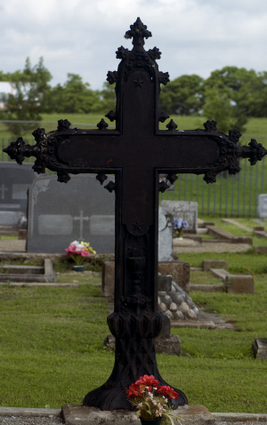The Gothic Cross

Gothic Cross
The Gothic Cross is said to represent the intersecting of Heaven and Earth - the Spiritual and the Material worlds. The four quadrants delineated by the arms of the cross can be seen as the four cardinal directions- North, South, East, and West, or the four Alchemical elements-- Earth, Air, Fire, and Water.
The association of fashion and death is central to gothic style, hence the Gothic Culture of today does not represent the Christian view; nevertheless the Cross is considered by some to be a Sacred Symbol.
The Goths were first recognized as in East Germanic tribe, but not much is known about their origination. Although disputed by some, according to the the historian Jordanes, the Goths are said to have arrived from somewhere in modern Sweden, crossing the Baltic Sea shortly before the 2nd century.
After the second century the Goths began migrating to the southeast reaching Scythia in modern Ukraine.
The Scythian Goths were divided into distinct entities during the third and fourth centuries. They repeatedly waged battle against the Roman Empire and in the late 4th century were invaded and subdued by the Huns, and were then integrated into the Hunnic Empire.
A Gothic missionary, Wolfila converted the Goths to Christianity. The Gothic Christianity is the earliest instance of the Christianizing of a Germanic people. When it became necessary for Wolfila to leave The Gothic country for Moesia his congregation followed him. There he translated the Bible into Gothic.
During the fifth and sixth centuries the Goths divided again and established powerful states in the Western Roman Empire in the Iberian peninsula and Italy. The Gothic Kingdom was then defeated by the Eastern Roman Empire. The Visigoths in Hispanic were converted to Catholicism in late sixth century and survived until early eighth century when it fell to Islam.
Although it is thought that during the sixteenth century a small remnant of Ostogoths may have been identified in Crimea, this cannot be confirmed. Except for a few fragments found in other cultures, the Gothic language and culture have completely disappeared.
Blessings,
Samuel Mills
